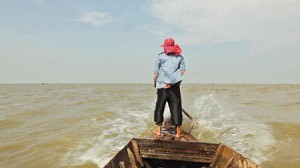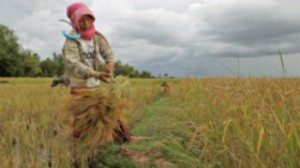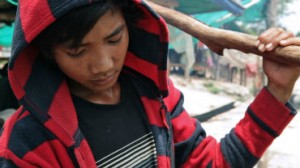A River Changes Course Debuts at Sundance Film Festival
A Devastatingly Beautiful New Take on the Cambodian Experience

(Photo courtesy of A River Changes Course)
“I feel my life is divided in half,” says Khieu Mok. Compelled by her family’s mounting debts to trade the farmer’s life in Svay Rieng for work in a garment factory on the outskirts of Phnom Penh, Khieu is torn between keeping her factory job in order to pay down those debts more aggressively or returning to the mother who now longs for her return. At a loss, she finally doles out the fee to use a shop’s telephone, and with a brave face, phones her mother for guidance. Upon being told to come home, Khieu hangs up and, seemingly torn between relief and worry, covers her face in her hands.
This is one of countless heartrending moments captured in A River Changes Course, a new documentary film produced by the Documentation Center of Cambodia (DC-Cam) with Youk Chhang as executive producer, directed by Khmer-American filmmaker Kalyanee Mam (cinematographer for the Academy Award-winning documentary Inside Job), and produced by Mam and Ratanak Leng. The film had its Cambodian premiere on October 11, 2012 at Phnom Penh’s Chenla Theatre, with a rapturous reception by an audience of nearly 600 that included garment workers’ families bussed in by DC-Cam from Takeo, Kampong Speu, and Kampong Chhnang provinces for the occasion.
Four years in the making, A River Changes Course charts the lives of three Cambodians and their families over several years. In addition to Khieu, the film gives rare insight into two of Cambodia’s minority groups, focusing on Sari Math, a young Cham fisherman living in Kampong Chhnang in central Cambodia on the banks of the Tonle Sap, as well as Samourn Sav, a member of the Cha-ray indigenous people living in a remote forest in Ratanakiri in far northeast Cambodia.
 Despite the differences in ethnicity, occupation and geographic location, the families portrayed in the film share a common Cambodian experience, with the lives of the three principals joined by some entirely shared themes. Each is just trying to get by and provide as best they can for their family and for future generations. Thoughts of the future, however, are a constant source of worry and struggle for all.
Despite the differences in ethnicity, occupation and geographic location, the families portrayed in the film share a common Cambodian experience, with the lives of the three principals joined by some entirely shared themes. Each is just trying to get by and provide as best they can for their family and for future generations. Thoughts of the future, however, are a constant source of worry and struggle for all.
Samourn details the deforestation in Ratanakiri and her fears that “sooner or later it will all be gone.” Sari, likewise, laments, “For the future generations, all the fish will be gone,” with overfishing now significantly reducing the amount and quality of fish that his family can catch in a day. Meanwhile, a surprise visit by debt collectors to Khieu’s mother, one of whom smiles at her difficulty in paying the required amount, highlights the challenges created by mounting debts. Each worries that the future generations will only be able to work for someone else — whether a factory owner or the Chinese.
These shared experiences expose a kind of solidarity, a fraternity of the Cambodian people. This theme was underscored at the film’s Cambodian premiere, when a Cham woman stood to thank Mam for showing that the Cham are just like other Cambodian people. In addition, when, during the panel discussion, Samourn was too shy to speak about her experiences, an audience member stood to address her. Waving at her in greeting, he explained that he was also a Cha-ray person, living in Phnom Penh, so Samourn should not feel she was alone. He coaxed her to convey her thoughts to the audience in their ethnic dialect, which he then translated.
A River Changes Course contains beautiful, tender and sometimes hilarious moments that prompted raucous laughter and conversation from the premiere audience, none more so than when Akai, Sari’s younger brother, jumps naked onto a nearby boat, wriggles joyously, and dives into the river. Equally though, there are moments, including revelations of death and loss, that compelled a somber silence.
 The film is also technically spectacular. Mam’s cinematography sets the scene with sweeping shots highlighting the stunning beauty of the country’s landscape and the devastating scars that development has carved into the land. Her close and lingering shots of the principals convey their emotional responses to great effect, while Angie Yesson’s sound design makes the audience feel as if they are part of the film, hearing every whispering wind, lapping of the waves, and rustle of rice grains as they are tossed and sifted.
The film is also technically spectacular. Mam’s cinematography sets the scene with sweeping shots highlighting the stunning beauty of the country’s landscape and the devastating scars that development has carved into the land. Her close and lingering shots of the principals convey their emotional responses to great effect, while Angie Yesson’s sound design makes the audience feel as if they are part of the film, hearing every whispering wind, lapping of the waves, and rustle of rice grains as they are tossed and sifted.
While A River Changes Course reveals a Cambodia at a precarious crossroads, it also introduces Cambodian people who share an inspirational honesty, heart, and commitment to their families’ future. It is not an easy film to watch, and its themes will linger for a long time. Yet, as a profound new take on the Cambodian experience, it is an important film and a must-see.
A River Changes Course will make its worldwide premiere at Sundance Film Festival on January 18, 2013, with additional screenings January 21-26. More information is available at the Sundance Film Festival site at http://www.ariverchangescourse.com/ and http://filmguide.sundance.org/film/13060/a_river_changes_course.
An edited version of this story was previously published by The Phnom Penh Post at http://www.phnompenhpost.com/7days/2003-the-ebb-and-flow-of-a-river-running-wild.
